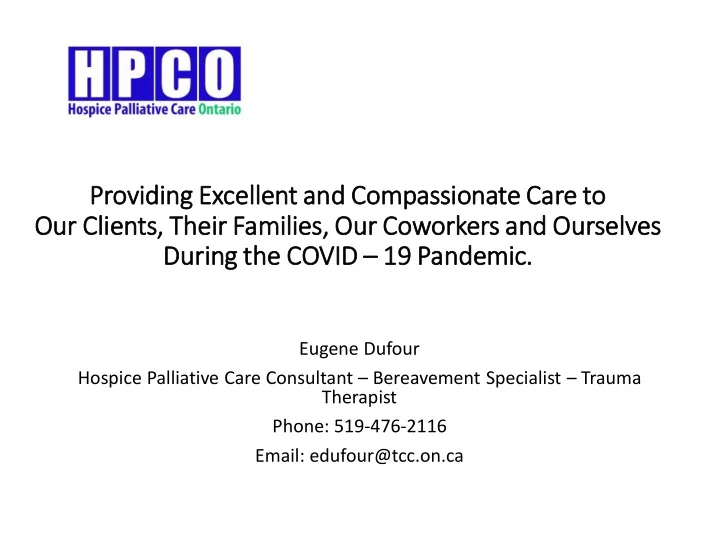

Providing Ex Exce cellent and and Com ompassio ionate Car are to Our ur Clie lients, The heir Fam amili lies, Our ur Coworkers s an and Our urselves Du During the COVID – 19 19 Pan andemic. Eugene Dufour Hospice Palliative Care Consultant – Bereavement Specialist – Trauma Therapist Phone: 519-476-2116 Email: edufour@tcc.on.ca
Sess ssion n 10 - Self f Care - A B C’s of Self Care - Reflec eflective e Pr Practice - Connected to Your “Vital Breath” - Tool ols s of the Trade de The secret of living well is not in having all the answers but in pursuing unanswerable questions in good company. Ra Rachel Na Naomi Reme men
“For too long care has been conceived of as either practitioner-centered or client-centered. In actuality, the healing relationship has always been a crucible for mutual transformation.” (Santorelli, 1999)
Caregiver vs. Care Partner Caring is a partnership where one person reveals their pain, brokenness and vulnerability to another. Through a relationship of trust, they work together towards healing and wholeness. O’Rourke and Dufour Embracing the End of Life
Self lf Car are Self lf- care is not an “emergency response plan” to be activated when when stress be becomes over erwhelm elmin ing. Instead, healthy self-care is an intentional way of living by which our values, attitudes, and actions are integrated into our day-to-day routines. The need for “emergency care” should be an exception to usual practice.
Everyone alive has suffered. It is the wisdom gained from our wounds and from our own experiences of suffering that makes us able to heal. Becoming expert has turned out to be less important than remembering and trusting the wholeness in myself and everyone else. Expertise cures, but wounded people can best be healed by other wounded people. Only other wounded people can understand what is needed, for the healing of suffering is compassion, not expertise. Rachel l Naomi Rem emen en
Self lf Care Self lf- care is not about acting selfishly (“It’s all about me!”) Instead, healthy self-care is about being a worthy steward of the self — body, mind and spirit — with which we’ve been entrusted. It is foolhardy to think we can be providers of care to others without being the recipients of proper nurture and sustenance ourselves.
Self Self Ca Care Self lf-care e is s not t about doin ing more, e, or ad addin ding more e ta tasks to to an an already overflowing “to do” list. Instead, healthy self- care is as much about “letting go” as it is about taking action. It has to do with taking time to be a human being as well as a human doing . It is about letting go of frenzied schedules and meaningless pursuits. Self-care has been conceptualized in three related domains — awareness, balance, and connection — the “ABC’s” of self -care.
AWARENESS Self lf-care be begin ins in n still illness. By quiet quietin ing our ur bus busy y lives and nd enterin ing into a spac space of so solit litude, we can de develo lop an n awar areness of f our ur own true ne needs, and nd the hen act t accor ordin ingly ly. Parker Palmer in Let Your Life Speak suggests reflection on the following question: “Is the life I am living the same as the life that wants to live in me?”
BAL ALANCE Self-care is a balancing act. It includes balancing action and mindfulness. Balance guides decisions about embracing or relinquishing certain activities, behaviors, or attitudes. It also informs the degree to which we give attention to the physical, emotional, psychological, spiritual, and social aspects of our being or, in other words, how much time we spend working, playing, and resting. A helpful prescription for balanced daily living includes eight hours of work, eight hours of play, and eight hours of rest!
Con onnectio ion Healthy self-care cannot take place solely within oneself. It involves being connected in meaningful ways with others and to something larger. We are decidedly interdependent and social beings. We grow and thrive through our connections that occur in friendships, family, social groups, nature, recreational activities, and spiritual practices. Our most renewing connections can be found right in our midst in the workplace, with co-workers and with the individuals to whom we provide care.
Refl flection - Hal Half a a da day per per week. - One One da day y per per mo month. - One One week per per yea ear.
Ques uestio ion: n: Ar Are e you ou a a lover of of cri riticism or or a a cri ritical lover?
Spirituality “Your vital breath ”
Helping, fixing, and serving represent three different ways of seeing life. When you help, you see life as weak. When you fix, you see life as broken. When you serve, you see life as whole. Fixing and helping may be the work of the ego, and service the work of the soul. Rachel Naomi Remen
NEW COVID-19 RESOURCES COVID-19 SPECIFIC CONVERSATION GUIDES: • Proactive Goals of Care (GOC) conversations • GOC conversations for a person with mild/mod COVID-19 • GOC conversation for a person with severe COVID-19 • Phone conversations with families of a dying person OTHER COVID RESOURCES: • Palliative symptom management suggested order set for LTC • Advance Care Planning guides for patients and SDM • Sample letter from LTC facilities to families and residents ALWAYS AVAILABLE: • Advance Care Planning, Goals of Care and Consent resources for healthcare providers (conversation guides, e-learning modules) • Person-Centred Decision-Making Toolkit https://www.hpco.ca/
Recommend
More recommend